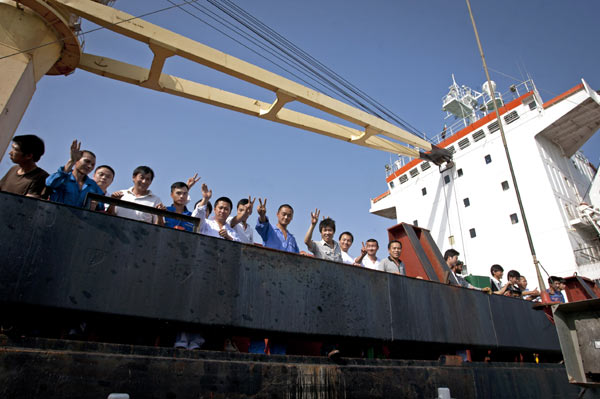Sailors lauded for bravery
Updated: 2012-04-09 06:55
(China Daily)
|
||||||||
Chinese crew hijacked by Somali pirates freed after help from Teheran
"It was the scariest moment in my life when the Iranian navy exchanged fire with the Somali pirates," recalled Meng Qingchang, second mate of a Panama-registered freight briefly hijacked by the pirates on Friday off the southern coast of Iran.
The 28 Chinese sailors have each been awarded $10,000 by the ship's owner for their "bravery against the pirates".
 |
|
Rescued Chinese sailors on board the Xianghuamen wave on Saturday to the delegation from the Chinese embassy at Port of Bandar Abbas in southern Iran. [Photo/Xinhua] |
This was because they too played a role in ending the nine-hour incident, which eventually saw the armed pirates surrendering to the Iranian navy, according to some of the crew members who spoke to Xinhua News Agency on Saturday.
Li Shengming, the chief engineer, was an apparent hero among the bunch.
The native of Jiangsu province, where the Xianghuamen cargo ship's owner is based, evacuated with 26 others to the security cabin, which was secured by four doors, after discovering that nine Somali pirates on a speedboat were fast approaching them at about 9:15 am on Friday local time. The ship was then in the Gulf of Oman and heading for the Imam Khomeini port in southwestern Iran.
He Feng, the captain, activated the Ship Security Alert System onboard and shut down all power before rushing to the cabin.
Armed with four AK-47s, a bazooka, three handguns and some knifes, the pirates climbed onto the freighter with their own ladders 25 minutes later. They smashed open three doors over a period of two hours, before the crew opened the last one.
The pirates then forced the 27 men into the bridge, found the other crew member, Zhang Yong, in the incinerator, and ordered Li to resume power and head to Somalia.
Meanwhile, in Teheran, the Chinese embassy asked the Iranian Foreign Ministry and military for help and contacted the Nanjing Ocean Shipping Company in Jiangsu for the list of the hijacked crew's names. The company soon forwarded the list to both the embassy and the Rescue Coordination Center in Iran.
"The thought of the Xianghuamen being hijacked there never crossed anybody's mind at the time. The globally recognized 'pirate zone' is primarily around the Gulf of Aden. And if commercial vessels like ours would cross it, we'd ask for naval escort fleet," said NASCO General Manager Xu Chuanguang.
The Iranian authorities quickly responded. At roughly 1 pm, Li saw on radar that the vessel was being followed by two Iranian warships. An hour later, the sailors received a phone call from the Maritime Rescue Coordination Center. In the presence of two English-speaking pirates, Li reported to the center - in Mandarin - the number of hijackers and their weapons.
The standoff between the pirates and the Iranian warships went on for an hour. The pirates forced all sailors except He, Li and an officer to stand on both sides of the bridge as human shields.
At around 3 pm, Li told the pirates that he had to go to the engine room to check the equipment. There he gathered four other sailors to discuss possibilities of evacuation. During the discussions, Chen Jian, the chief mate, called Li to tell him that the Iranian navy had asked the crew to cut power and stand by for an offensive.
At about 5 pm, the Iranian warship exchanged fire with the pirates. Li and the four sailors shut the engine down, jumped into the sea and swam toward the Iranians.
Outraged, the pirates demanded the remaining crew restart the engine. But the sailors who knew how to do it had already escaped.
As the vessel could not sail forward, the pirates threw their weapons into the sea and surrendered to the Iranian navy.
One sailor, Li Guwen, was injured in the exchange of gunfire. A stray bullet fired by the pirates grazed his head.
"I was scared by the sound of firing, and I didn't even know that I was hurt until my colleagues saw my head bleeding," he said.
The six sailors who escaped were rescued by the Iranian warship, where they spent the night before being sent back to the Xianghuamen.
"They (the Iranian navy) treated us well, providing us with clean and dry clothes. We were served the same food they had," Li Chaoqun, one of the six men, told Xinhua.
Yu Hongyang, Chinese ambassador to Iran, led a five-member embassy delegation to go on board the Xianghuamen and greet the crew on Saturday afternoon. He praised the wisdom and bravery of the sailors, and stressed that the Chinese and Iranian governments had joined hands in the rescue mission.
China Daily-Xinhua

 Relief reaches isolated village
Relief reaches isolated village
 Rainfall poses new threats to quake-hit region
Rainfall poses new threats to quake-hit region
 Funerals begin for Boston bombing victims
Funerals begin for Boston bombing victims
 Quake takeaway from China's Air Force
Quake takeaway from China's Air Force
 Obama celebrates young inventors at science fair
Obama celebrates young inventors at science fair
 Earth Day marked around the world
Earth Day marked around the world
 Volunteer team helping students find sense of normalcy
Volunteer team helping students find sense of normalcy
 Ethnic groups quick to join rescue efforts
Ethnic groups quick to join rescue efforts
Most Viewed
Editor's Picks

|

|

|

|

|

|
Today's Top News
Health new priority for quake zone
Xi meets US top military officer
Japan's boats driven out of Diaoyu
China mulls online shopping legislation
Bird flu death toll rises to 22
Putin appoints new ambassador to China
Japanese ships blocked from Diaoyu Islands
Inspired by Guan, more Chinese pick up golf
US Weekly

|

|






